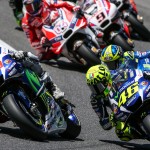Coming from Mugello and heading into Barcelona, MotoGP finds itself in the middle of the early summer stretch of classic European tracks. Jerez, Le Mans, Mugello, Montmeló, Assen, Sachsenring, Brno: these are the circuits that have been the backbone of Grand Prix racing for the past 20 years or so. When I think of MotoGP, these are the tracks I think of. Massive crowds of passionate fans at tracks made for two-wheeled racing, and with motorcycle culture at their very heart. (Le Mans may be the exception there: the track is a little too stop-and-go, and the fans are mainly passionate about spreading mayhem and misadventure, the reason I avoid the event.)
How long will it stay like this, though? This is the time that negotiations start for the coming MotoGP season, and it’s not just the riders and teams who are doing the talking. Preliminary conversations will be starting with venues, too, with Dorna talking to their counterparts at Formula One about a very rough planning of their 2017 schedule. Among the circuits hopeful of being added to the 2017 MotoGP calendar are tracks in Indonesia, Thailand and Kazakhstan, while Chile and Brazil are also contenders. There has even been talk in the past of races in Russia, the Crimea, India, and Singapore.
There are a lot of reasons why MotoGP needs to head east. As anyone with a racing-related Twitter account and more than a handful of followers can attest, they love their MotoGP in South East Asia. Motorcycle manufacturers love them too: Asia and South America are booming markets where bikes sales are in the millions. Yamaha, Honda, Suzuki, and now even Ducati are sending their riders to PR events throughout the region, to help sell their bikes in growing economies. A growing middle class has also seen a boom in sales of higher end bikes, hence Ducati’s entry into the fray.
This love for all things two-wheeled, and especially for racing, means that Asia and South America are crying out for a race, and Dorna are crying out to give them one, or preferably more. If Dorna had their way, there would be a race in Indonesia, one in Brazil, one in Chile, and a race in India too. But, I hear you ask, don’t Dorna run the sport? Surely, if they want a race somewhere, they can just decide to have one?
If only it were that simple. First and foremost, there is the small matter of having a circuit in place, and one which lives up to the safety standards required by the FIM. That is the main reason there has not been a race yet in Indonesia, for example. There has been a lot of talk of MotoGP returning to Sentul, near Jakarta, but the track there is simply not up to hosting a Grand Prix. It badly needs resurfacing and the facilities are not apt for a Grand Prix paddock, the number of teams and space they take up having vastly expanded since the last time they were there back in 1997. There are plans to upgrade the track but this runs into the biggest obstacle facing any prospective MotoGP race anywhere in the world: Politics.
The money needed to pay for the upgrades at the Sentul circuit is supposed to come from the public purse, but the local government is less than keen on paying out taxpayers’ money to the circuit’s owners. For the track is owned by the family of Tommy Suharto, son of the former Indonesian dictator, and a convicted murderer. They fear any subsidy paid to the Suharto clan will disappear into the family’s already vast fortune, rather than being spent on work to improve the track. So the government has said that they will only pay for upgrades to Sentul if the track is in public ownership.
At the moment it looks like a race in Indonesia will not take place at Sentul but rather at a new circuit to be built near Palembang in South Sumatra. The downside to this is that the site is 500 kilometres from the capital Jakarta, and on a different island. Though Palembang’s population of well over 1.5 million should be enough to fill the stands at a race track, it would be much easier if the track was near Jakarta, which is home to nearly 10 million people and a major international airport.
Politics is key to another problem with going to possible venues. Of the potential host countries for a MotoGP race, Indonesia is ranked 88th on the Transparency International Global Corruption Index, Brazil and Thailand tied 76th, and Kazakhstan 123rd. Only Chile has anything like a decent record, ranking 23rd on the list, equal with France and, interestingly, well ahead of Spain, Italy and the Czech Republic. What that means in practice is that getting things done requires either a lot of money to help grease the wheels of commerce, or powerful political friends who can ensure that movements happen. In a country like Indonesia, with its endemic corruption, just getting to and from the track can be an expensive and difficult business if the local police decided to start demanding bribes. When the race has the backing of a powerful local politician, they can make sure that the police leave the teams and riders well alone.
However, the risks of relying on powerful local friends were made visible by the World Superbike rounds held near Moscow. That race was held because it had the backing of a regional governor who had an interest in motorsports, but that governor fell out of favour with Moscow, and his influence waned. The Russian round of World Superbikes waned along with it.
Sometimes, it is simply bureaucracy that stands in the way. India hosted a round of World Superbikes but that race did not last very long. Local customs laws meant that teams had to pay a deposit equivalent to the full value of all bikes and equipment that entered the country, repayable only once all of the equipment they brought into the country had left it again. What’s more, there was a six-week period needed for customs clearance, making getting equipment in and out of the country in time for the next race virtually impossible.
This could signal trouble ahead for a British round of MotoGP as well depending on how the EU referendum goes on 23rd June. Should the UK vote to leave the EU, all existing customs rules will be dissolved, and have to be renegotiated. Grand Prix motorcycle racing could find itself caught in limbo for their visit to Silverstone, with a lack of clear direction on what the rules will be for importing and exporting many millions of pounds of worth of exotic racing equipment into the UK. F1 could be in an even bigger pickle, with so many teams based in the UK.
So while Dorna and the factories hope to be able to expand into Asia and South America in the foreseeable future – and perhaps even next year – the task is not as simple as it appears. Nobody thinks that having four MotoGP races in Spain is a particularly good idea, but the fact is that they are held at safe circuits, with high attendance, and with local politicians bending over backwards to make the races happen (though Barcelona’s new mayor may be the first to hold a different view on that). The heart of the MotoGP season will continue in Europe for a while yet. But it can’t go on forever.








